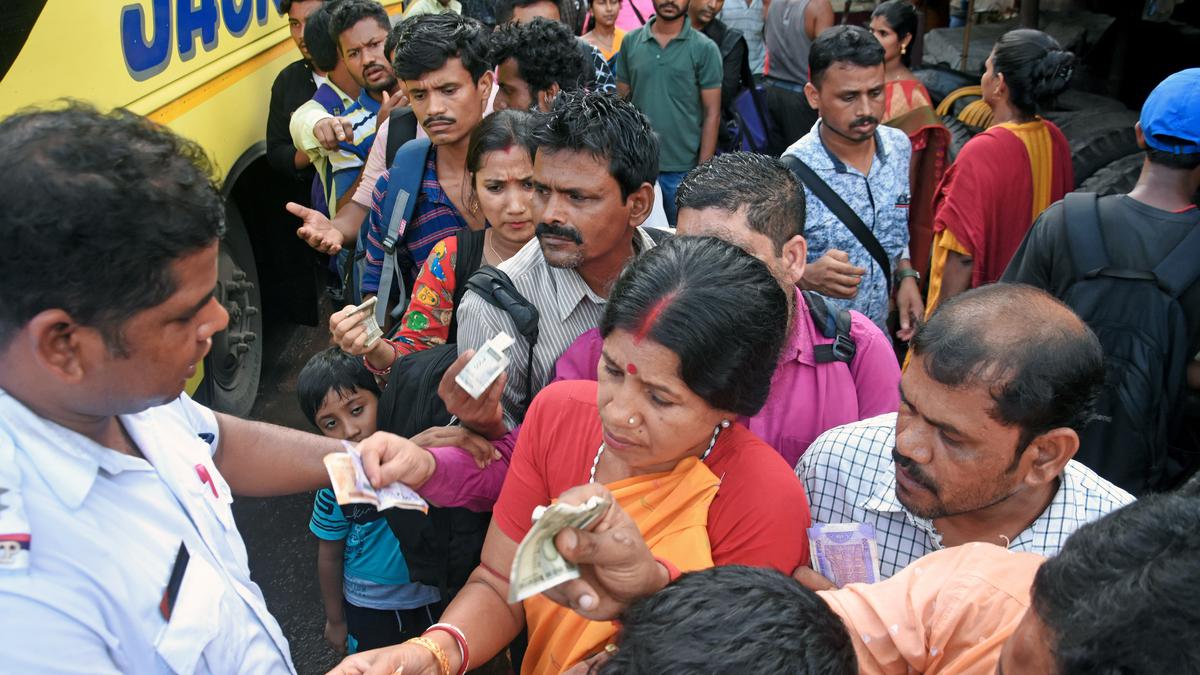
West Bengal panchayat polls | Voting begins for 73,000 seats
The Hindu
Updates on the voting day for the West Bengal panchayat elections on July 8, 2023
Polling began at 7 am on Saturday, July 8, 2023, amid tight security for the West Bengal panchayat elections, in which about 5.67 crore people living in the State's rural areas are eligible to vote, officials said.
A total of 2.06 lakh candidates are in the fray for elections to 73,887 seats in the three-tier panchayat system in the State, they said.
The election assumes significance for political parties as it will serve as an opportunity for them to assess their organisational strengths and weaknesses ahead of the 2024 Lok Sabha polls, besides broadly outlining the mood of the State after two years of the TMC government's third consecutive term.
Sporadic incidents of violence were reported across the State after the election dates were announced on June 8, resulting in the deaths of over 15 people.
There are 63,229 gram panchayat seats and 9,730 panchayat samiti seats in 22 districts, while 928 zilla parishad seats in 20 districts as Darjeeling and Kalimpong have a two-tier system with Gorkhaland Territorial Administration (GTA) and Siliguri Sub-divisional Council at the top.
Long queues outside polling booths were seen as early as 6 am with people turning out early amid the intermittent rains.
The ruling TMC is contesting all the 928 seats in zilla parishads, 9,419 seats in panchayat samitis and 61,591 seats in gram panchayats. The BJP has fielded candidates in 897 zilla parishad seats, 7,032 panchayat samiti seats and 38,475 seats in gram panchayats.

“Writing, in general, is a very solitary process,” says Yauvanika Chopra, Associate Director at The New India Foundation (NIF), which, earlier this year, announced the 12th edition of its NIF Book Fellowships for research and scholarship about Indian history after Independence. While authors, in general, are built for it, it can still get very lonely, says Chopra, pointing out that the fellowship’s community support is as valuable as the monetary benefits it offers. “There is a solid community of NIF fellows, trustees, language experts, jury members, all of whom are incredibly competent,” she says. “They really help make authors feel supported from manuscript to publication, so you never feel like you’re struggling through isolation.”

Several principals of government and private schools in Delhi on Tuesday said the Directorate of Education (DoE) circular from a day earlier, directing schools to conduct classes in ‘hybrid’ mode, had caused confusion regarding day-to-day operations as they did not know how many students would return to school from Wednesday and how would teachers instruct in two modes — online and in person — at once. The DoE circular on Monday had also stated that the option to “exercise online mode of education, wherever available, shall vest with the students and their guardians”. Several schoolteachers also expressed confusion regarding the DoE order. A government schoolteacher said he was unsure of how to cope with the resumption of physical classes, given that the order directing government offices to ensure that 50% of the employees work from home is still in place. On Monday, the Commission for Air Quality Management in the National Capital Region and Adjoining Areas (CAQM) had, on the orders of the Supreme Court, directed schools in Delhi-NCR to shift classes to the hybrid mode, following which the DoE had issued the circular. The court had urged the Centre’s pollution watchdog to consider restarting physical classes due to many students missing out on the mid-day meals and lacking the necessary means to attend classes online. The CAQM had, on November 20, asked schools in Delhi-NCR to shift to the online mode of teaching.









